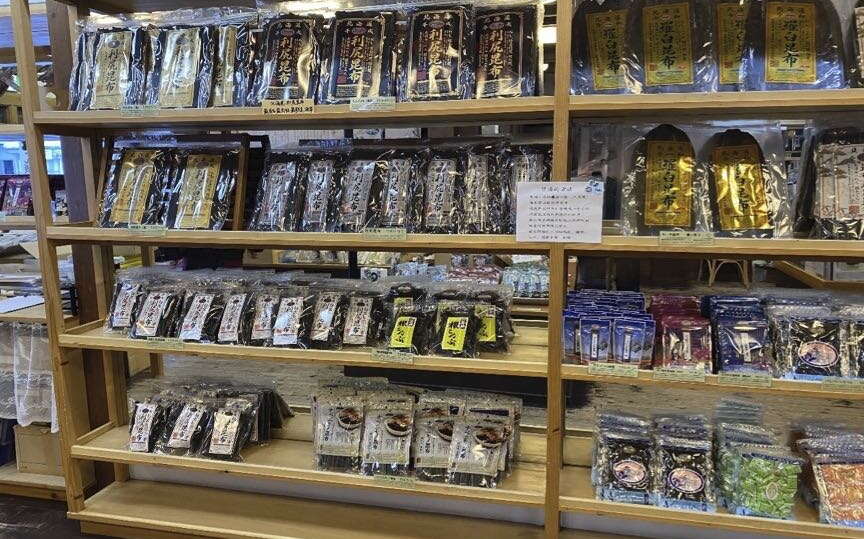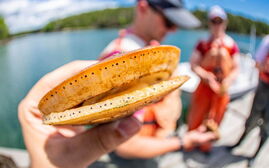
Maine delegation to visit Japan to study wild and farmed kelp industry
 Photo / Courtesy Atlantic Sea Farms
Maine’s kelp farming industry is young compared with Japan’s.
Photo / Courtesy Atlantic Sea Farms
Maine’s kelp farming industry is young compared with Japan’s.
Expanding on earlier visits to Japan to learn about scallop-growing techniques, 15 aquaculture and fisheries experts from Maine are headed back to study the Japanese wild and farm-raised kelp industry.
The delegation will visit Hokkaido, the largest of Japan’s islands and the northernmost prefecture, from June 9-14.
The group will focus their time primarily in the island’s Hakodate region, known for being Japan’s epicenter of kelp. Hokkaido has a climate and seasonality similar to Maine and is rooted in natural resource-based economies.
“Technology transfer is one of the fastest ways to build, support and ramp up an industry,” said Hugh Cowperthwaite, senior program director of fisheries and aquaculture at Coastal Enterprises Inc. and an organizer of the trip.
“By spending time in Japan, our hope is to gain first-hand experience meeting with growers, wild harvesters and processors to learn how kelp is grown, harvested and made into various products in order to continue our work in Maine diversifying Maine’s coastal economy.”

The kelp industry in the U.S. is relatively young.
Maine represents the majority of farmed seaweed in the nation and just one company, Atlantic Sea Farms in Biddeford, represents the majority of those farms.
But the company’s production “is still very small as compared to Japan — and we have a lot to learn in order to continue to sustainably scale the industry," said Briana Warner, the company’s president and CEO.
By contrast, Japan’s kelp and seaweed industry traces back to the mid-17th century and the products are a typical ingredient in Japanese cuisine.
The delegation will meet with chefs, fishermen, growers, processors, retailers, restaurateurs and scientists.
Cowperthwaite has been working with Keiichiro Hamano, CEO of Japan Fishing Machine LLC to plan logistics for the eight-day trip.
Japan Fishing Machine LLC focuses on the sale and promotion of specialized for scallop farming and squid jigging machines and equipment to international markets, including the U.S.
The two met in January 2023. Hamano has helped the delegation establish connections in Japan and will serve as the host and guide.
“We are excited to share our industry with Maine and it goes both ways,” said Hamano. “Japan’s industry will benefit from meeting with kelp industry from other part of the world.”
Cowperthwaite has been helping U.S. businesses build relationships with Japanese businesses since 2010.
Along with Warner, other Atlantic Sea Farms employees participating in the tour will be Casey Ballin, director of operations and sustainability; Liz MacDonald, seaweed supply director; and Thew Suskiewicz, director of seaweed science.
Representatives from other kelp-based businesses in the delegation include:
- Bob Baines from South Thomaston, a commercial fisherman of lobster and scallops and a partner farmer with Atlantic Sea Farms.
- Nathan Johnson, from Long Island in Casco Bay, one of the first kelp farmers in Maine. He also fishes for bluefin tuna and is involved with marine energy development around the world.
- Keith Miller a fisherman and seaweed farmer from Spruce Head and one of the first people in the country to start a commercial seaweed farm.
- Seraphina Erhart and Shep Erhart of Maine Coast Sea Vegetables, an employee-owned company in Hancock selling products made from eight species of certified organic wild seaweeds. Shep Erhart founded Maine Coast Sea Vegetables in 1971 and was a pioneer in harvesting, processing and selling wild seaweeds from the downeast Maine coast.
- Lia Heifetz, co-founder of Barnacle Foods in Juneau, Alaska. The company uses farmed and wild kelp to make food products designed to be familiar to the U.S. palate.
The delegation will be rounded out by Scott Lindell, a research specialist at Woods Hole Oceanographic Institution who specializes in the scientific research and development of shellfish and seaweed farming; and Jaclyn Robidoux, a marine extension team member of the Maine Sea Grant Program who focuses on the development of the seaweed sector in Maine.
Naoto Kobayashi, a retired Maine schoolteacher, will assist with translation. Kobayashi taught Japanese language at public elementary, middle and high schools in central Maine for about 30 years and started a high school exchange program with Japan in 1996.
The exchange is made possible by a grant from the Builders Initiative to Coastal Enterprises Inc.
Builders Initiative is the philanthropic team of Builders Vision, an impact investment company headquartered in Chicago. Builders Initiative invests in and collaborates with nonprofits, businesses and others working towards sustainable solutions to societal and environmental challenges.














0 Comments